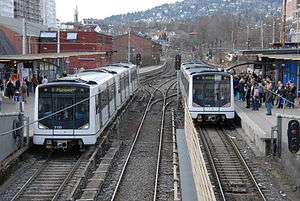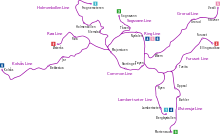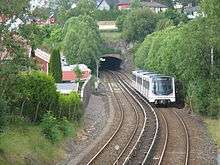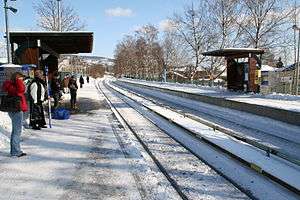List of Oslo Metro lines
The Oslo Metro is a rapid transit system serving Oslo and Bærum in Norway. The system is municipally-owned by Sporveien,[1] and operated by its subsidiary Sporveien T-banen under contract to Ruter, the Oslo public transport authority.[2] The metro has a daily ridership of 200,000,[3] and serves 101 stations.[4] The system consists of eight lines that operate as branches from the Common Tunnel—the shared section that runs 4.8 kilometers (3.0 mi) through the city center.[5][6] In addition, the Ring Line operates in a loop north of the city center.[7] There are six train services, numbered 1 through 6, that each operate from one branch via the city center to another branch or to the Ring Line. All services run every 15 minutes. Each branch has one service that operates to its terminus, except for the Lambertseter Line that has two.[8][9]


The first part of the metro was the Holmenkollen Line, that opened as light rail in 1898.[10][11] The Røa Line followed as a branch in 1912.[12] The system became the first Nordic underground railway in 1928, when the underground line to Nationaltheatret was opened.[13] The Østensjø Line opened in 1923,[14] the Kolsås Line in 1924,[15] and the Sognsvann Line in 1934.[16] The Kolsås Line opened as an extension of the Lilleaker Line, but in 1942 it was connected to the Common Tunnel, while the rest of the Lilleaker Line remains as a light rail connected to the Oslo Tramway.[15] The opening of the upgraded metro system in the eastern boroughs occurred in 1966, after the conversion of the 1957 Lambertseter Line to metro standard. This involves the lines using third rail instead of overhead wires, having 110-meter (360 ft) long platforms and automatic train protection in-cab signaling.[17] It was followed by the conversion of the Østensjø Line, as well as the new Grorud Line and Furuset Line.[18] In 1993, trains could, for the first time, run through the city between the two networks in the Common Tunnel.[19] The latest extension is the 2006 opening of the Ring Line, that connects the eastern and western network north of the city center.[7]
Parts of the system have been upgraded from light rail to metro standard. The Østensjø and Lambertseter Lines were converted in 1966, when the first sections of new metro line were opened.[20] The Sognsvann and Røa Lines, as well as the western part of the Common Tunnel, were upgraded in 1993 and 1995.[21] The Holmenkollen and Kolsås Lines were upgraded and subsequently re-opened in 2011 and 2014, respectively.[22][23] Following the upgrade, all T1000 stock can be retired and replaced by the new MX3000 trains.[24] The Grorud and Lambertseter Lines serve the Groruddalen valley while the Østensjø and Lambertseter Line serve the southern areas of Nordstrand.[25] These four lines have the highest ridership.[26] In the west, the Kolsås, Røa, Holmenkoll and Sognsvann Lines serves less densely populated areas. The Ring Line serves the northern borough of Nordre Aker, while the Common Tunnel serves the city center.[25]
List




The following table presents the eleven lines of the Oslo Metro. They are chronologically sorted by the date of the first section of line to open.[27] The service column indicates which of the six numbered services operates on most of the lines.[9] Services are omitted from lines where they serve only one or two stations. The date indicates the official opening date of the line on the section noted in the fourth column. Sections with blue background indicate lines that were opened as tramways, while white background indicates the line was converted to or built as metro standard.[27] The length column indicates the total length of the line at the time of opening or upgrade, and the extension column indicates the length of the extension. The station column indicates the number of stations on the line after the opening of each extension or upgrade.[28][29][30][31] Unless specified otherwise, the lines are metro standard.
| * | Light rail |
| Line | Service | Opened | Section | Length | Extension | Stations | ||
|---|---|---|---|---|---|---|---|---|
| km | mi | km | mi | |||||
| Holmenkollen* | 31 May 1898 | Majorstuen – Besserud* | 6.3 | 3.9 | 6.3 | 3.9 | 14 | |
| 16 May 1916 | Besserud – Frognerseteren* | 11.7 | 7.3 | 5.4 | 3.4 | 20 | ||
| Røa | 17 November 1912 | Majorstuen – Smestad* | 1.9 | 1.2 | 1.9 | 1.2 | 4 | |
| 24 January 1935 | Smestad – Røa* | 4.8 | 3.0 | 2.9 | 1.8 | 10 | ||
| 22 December 1948 | Røa – Grini* | 5.7 | 3.5 | 0.9 | 0.6 | 12 | ||
| 3 December 1951 | Grini – Lijordet* | 6.9 | 4.3 | 1.2 | 0.75 | 14 | ||
| 16 November 1971 | Lijordet – Østerås* | 7.5 | 4.7 | 0.6 | 0.4 | 15 | ||
| 5 February 1992 | Metro standard Lijordet – Østerås | — | 10 | |||||
| Østensjø | 18 December 1923 | Helsfyr – Brynseng* | 0.8 | 0.5 | 0.8 | 0.5 | 2 | |
| 10 January 1926 | Brynseng – Oppsal* | 4.0 | 2.5 | 3.2 | 2.0 | 4 | ||
| 20 July 1958 | Oppsal – Bøler* | 5.4 | 3.4 | 1.4 | 0.9 | 6 | ||
| 29 October 1967 | Metro standard Tøyen – Bøler | 7.1 | 4.4 | 1.7 | 1.1 | 8 | ||
| 26 November 1967 | Bøler – Skullerud | 9.2 | 5.7 | 2.1 | 1.3 | 10 | ||
| 4 January 1998 | Skullerud – Mortensrud | 11.5 | 7.1 | 2.3 | 1.4 | 11 | ||
| Kolsås | 3 November 1924 | Jar – Avløs* | 4.5 | 2.8 | 4.5 | 2.8 | 8 | |
| 1 January 1930 | Avløs – Kolsås* | 7.8 | 4.8 | 3.3 | 2.1 | 12 | ||
| 15 June 1942 | Jar – Sørbyhaugen* | 11.8 | 7.3 | 4.0 | 2.5 | 17 | ||
| 20 August 2008 | Metro standard Husebybakken – Åsjordet | 2.3 | 1.4 | — | 3 | |||
| Common | 28 June 1928 | Majorstuen – Nationaltheatret* | 2.0 | 1.2 | 2.0 | 1.2 | 3 | |
| 22 May 1966 | Tøyen – Jernbanetorget | 1.6 | 1.0 | 1.6 | 1.0 | 3 | ||
| 9 January 1977 | Jernbanetorget – Stortinget | 2.1 | 1.3 | 0.5 | 0.3 | 4 | ||
| 6 March 1987 | Stortinget – Nationaltheatret* | 4.8 | 3.0 | 0.7 | 0.4 | 6 | ||
| 5 May 1992 | Metro standard Stortinget – Majorstuen | — | ||||||
| Sognsvann | 10 October 1934 | Frøen – Sognsvann* | 6.0 | 3.7 | 6.0 | 3.7 | 11 | |
| 5 May 1992 | Metro standard Majorstuen – Sognsvann | — | 9 | |||||
| Lambertseter | 26 April 1957 | Brynseng – Bergkrystallen* | 5.9 | 3.7 | 5.9 | 3.7 | 8 | |
| 22 May 1966 | Metro standard Brynseng – Bergkrystallen | — | ||||||
| Grorud | 16 October 1966 | Tøyen – Grorud | 9.2 | 5.7 | 9.2 | 5.7 | 11 | |
| 3 March 1974 | Grorud – Rommen | 10.5 | 6.5 | 1.3 | 0.8 | 13 | ||
| 18 August 1974 | Rommen – Stovner | 12.2 | 7.6 | 1.7 | 1.1 | 14 | ||
| 21 December 1975 | Stovner – Vestli | 13.6 | 8.5 | 1.4 | 0.9 | 15 | ||
| Furuset | 18 November 1970 | Hellerud – Haugerud | 2.0 | 1.2 | 2.0 | 1.2 | 2 | |
| 15 December 1974 | Haugerud – Trosterud | 2.9 | 1.8 | 0.9 | 0.6 | 3 | ||
| 19 February 1978 | Trosterud – Furuset | 5.3 | 3.3 | 2.4 | 1.5 | 5 | ||
| 8 November 1981 | Furuset – Ellingsrudåsen | 6.5 | 4.0 | 1.2 | 0.7 | 6 | ||
| Ring | 20 August 2003 | Ullevål stadion – Storo | 3.3 | 2.1 | 3.3 | 2.1 | 2 | |
| 21 August 2006 | Storo – Carl Berners plass | 5.0 | 3.1 | 1.2 | 0.7 | 3 | ||
| Løren | 3 April 2016 | Nydalen – Økern | 1.6 | 0.99 | 1.6 | 0.99 | 1 | |
References
Notes
- "Saksfremlegg: Etablering av nytt felles administrasjonsselskap for kollektivtrafikken". Akershus Amtstidende (in Norwegian). 17 August 2007. Retrieved 18 March 2009.
- "Administrasjon". Oslo T-banedrift (in Norwegian). Archived from the original on 24 July 2011. Retrieved 18 March 2009.
- Oslo T-banedrift (2007). "Årsrapport 2006" (PDF) (in Norwegian). Archived from the original (PDF) on 25 March 2009. Retrieved 18 March 2009.
- "Oslo får Nordens største T-banenett" (in Norwegian). ABC Nyheter. 3 April 2016. Retrieved 19 April 2016.
- "T-banestasjonene i vest" (in Norwegian). Ruter. 11 March 2008. Archived from the original on February 20, 2009. Retrieved 18 March 2009.
- "T-banestasjonene i øst" (in Norwegian). Ruter. 11 March 2008. Archived from the original on June 15, 2008. Retrieved 18 March 2009.
- "Tidslinje" (in Norwegian). Ruter. 11 March 2008. Archived from the original on June 21, 2008. Retrieved 18 March 2009.
- "Rutetider" (PDF) (in Norwegian). Ruter. 2009. Archived from the original (PDF) on 15 November 2009. Retrieved 13 November 2009.
- "Linjekart" (PDF). Ruter. 2008. Archived from the original (PDF) on 15 November 2009. Retrieved 18 March 2009.
- Ruter (11 March 2008). "Holmenkollbanenes stasjoner" (in Norwegian). Archived from the original on February 20, 2009. Retrieved 18 March 2009.
- Aspenberg, 1994: 8–9
- Aspenberg, 1994: 13
- Aspenberg, 1994: 17
- Aspenberg, 1994: 19
- Aspenberg, 1994: 18
- Aspenberg, 1994: 16
- Civitas (2006). "Kolsåsbanen i Bærum" (in Norwegian). Akershus County Municipality. Archived from the original (pdf) on 19 July 2011. Retrieved 1 April 2009.
- Aspenberg, 1994: 29
- Aspenberg, 1994: 30
- Aspenberg, 1994: 29–30
- Aspenberg, 1994: 62
- Juven, Olav (26 January 2009). "Holmenkollbanen under ombygging". Norwegian Broadcasting Corporation (in Norwegian). Retrieved 28 March 2009.
- Juven, Olav & Bertheussen, Linn (18 March 2009). "Kolsåsbanen er reddet". Norwegian Broadcasting Corporation (in Norwegian). Retrieved 1 April 2009.
- Ruter (10 March 2008). "MX3000 – nye T-banevogner" (in Norwegian). Archived from the original on June 15, 2008. Retrieved 28 March 2009.
- Aspenberg, 1994: 32–33
- Aspenberg, 1995: 39
- Oslo T-banedrift (2007). "Kort historikk" (in Norwegian). Archived from the original on 26 May 2011. Retrieved 28 March 2008.
- Ruter. "T-banestasjonene i øst" (in Norwegian). Archived from the original on 15 June 2008. Retrieved 30 March 2008.
- Ruter. "T-banestasjonene i vest" (in Norwegian). Archived from the original on 15 June 2008. Retrieved 30 March 2008.
- Oslo Package 2 (2001). "Fellesløft for bedre kollektivtransport Oslopakke 2" (PDF) (in Norwegian). Archived from the original (PDF) on 31 October 2010. Retrieved 29 March 2009.
- Aspenberg, 1995: 28
Bibliography
| Wikimedia Commons has media related to Rapid transit lines in Oslo. |
- Aspenberg, Nils Carl (1994). Trikker og forstadsbaner i Oslo. Oslo: Baneforlaget. ISBN 82-91448-03-5.
- Aspenberg, Nils Carl (1995). Neste stopp Makrellbakken: Historien om Røabanen. Oslo: Baneforlaget. ISBN 82-91448-18-3.